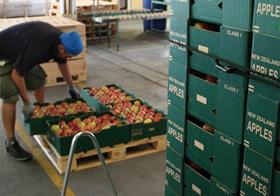
New Zealand's apple and pear volumes will be lower this season than predicted at the start of 2011, according to a new announcement issued by the country's industry body Pipfruit New Zealand.
In the statement, the group said that it appeared the crop would be 'significantly smaller' than the January estimate of 17.8m cartons.
Final volumes for early varieties such as Pacific Beauty and Cox Orange have apparently finished around 15 per cent behind the earlier forecast and that trend also appears to be consistent with varieties harvested later in the season.
'Now as the harvest nears an end, we can make an interim assessment of volume and market performance to date for apple and pear exports in 2011,' said Peter Beaven, chief executive of Pipfruit NZ.
Demand for Southern Hemisphere fruit has reportedly been solid so far this year, with reasonable early prices and demand in many Asian markets.
'Unique New Zealand varieties such as Pacific Queen and Pacific Rose are proving very popular with many consumers in markets such as China, India and Malaysia,' Beaven said.
New Zealand fruit continues to command a significant premium over other Southern Hemisphere origins, reflecting superior texture and colouring, he continued, adding that the first varieties marketed in key European markets, Cox Orange and Royal Gala, had been eagerly accepted at 'slightly better' prices than in 2010.
With several European supermarkets now having switched to New Zealand apples, volumes of the country's other main variety, Braeburn, are expected to be short of the pre-season estimate.
Pockets of hail and a recent storm in Hastings are expected to have some impact, with many growers opting to process their final harvest due to a lack of colouring.
'Our assessment is that this year’s Braeburn crop will struggle to get past last year’s volume of 70,000 tonnes,' Beaven predicted. 'This would make it the equal smallest crop in the past 10 years.'
New Zealand has established a strong reputation with its key customers in Europe as an innovative producer of safe, tasty apples and pears, he insisted.
'Consumers are prepared to pay premium prices for our apples and pears, especially in the late supply window from mid-June onwards,' Beaven stated. 'We will work hard with our partners to meet both demand and quality expectations.'



